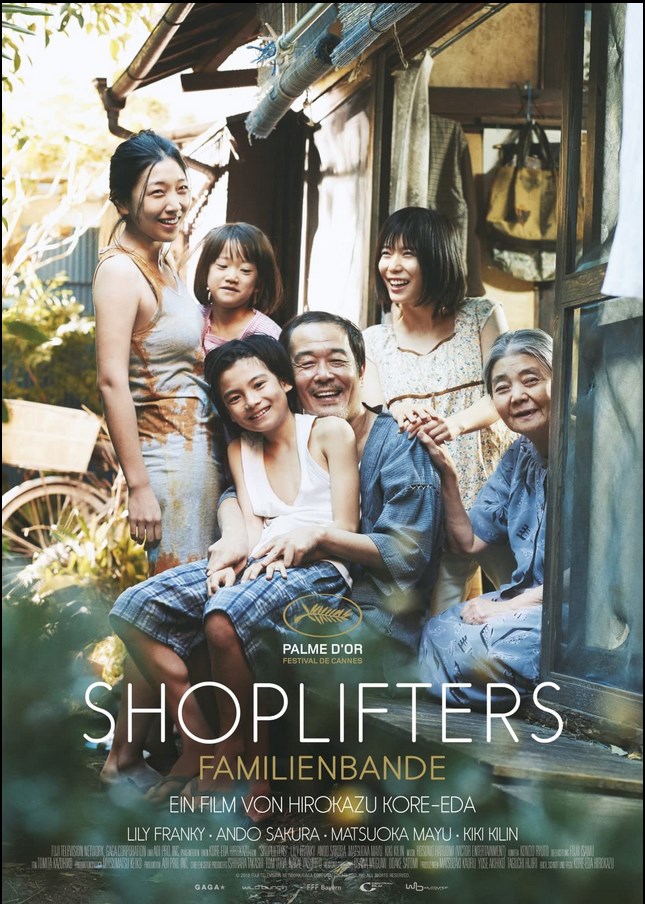[ENG/ESP] A Family Affair is a Japanese film where social inequalities are shown with a mixture of humour and irony. / Un Asunto de Familia es un film japonés donde las desigualdades sociales se muestran con una mezcla de humor e ironía.

Shoplifters is an excellent Japanese film that mixes drama, irony and humour of social inequalities within a Japanese family of humble origins that makes daily scams and petty thefts the reason of their lives.
The film is from 2018 and was directed by Hirokazu Kore'eda winning, among other awards, the Palme d'Or at the Cannes Film Festival that year.

Un Asunto de Familia conocida también en algunos países de Hispanoamérica como Somos Familia es un excelente fin japonés de que mezcla el drama, la ironía y el humor de las desigualdades sociales dentro de una familia japonesa de orígenes humildes que hace de las estafas y pequeños robos diarios la razón de su vida.
La película es del 2018 y fue dirigida por Hirokazu Kore'eda ganando, entre otros premios, La Palma de Oro en el Festival de Cannes de ese año.

Shoplifters is an intelligent, astute, original and committed work about a social reality that we often prefer to ignore, and Hirokazu Koreeda has managed to capture it perfectly in a film.
The director of celebrated works such as 'Like father, like son' or 'Our little sister' once again delights us with one of his favourite themes: hiding a social drama under the guise of a happy family.

Un Asunto de Familia o Shoplifters (Ladrones de Tiendas como se la conoce en inglés es una obra inteligente, astuta, original y comprometida con una realidad social a la que muchas veces preferimos ignorar y Hirokazu Koreeda ha logrado plasmarla en una película a la perfección.
El director de obras celebradas como 'De tal padre, tal hijo' o 'Nuestra hermana pequeña' nos vuelve a deliciar con uno de sus temas favoritos: ocultar un drama social bajo el aspecto de una familia feliz.

Returning from their umpteenth supermarket robbery, Osamu and his son Shota come home to find a little Yuri in a state of total distress who has also been mistreated.
Osamu's wife, although they all live in a state of semi-destitution, takes pity on the girl and lets her stay with them.
It is a very particular family. As already mentioned, the father and his son steal (without violence, i.e. they commit theft) generally in shops and supermarkets with such an ability to go unnoticed.
The grandmother, who usually represents the kindest element in any family tree, in this case lives on the pension of her long deceased husband.
The older sister designs and creates the shop windows and retail outlets, which she takes advantage of to monitor and discover their weaknesses and then commit theft.
When they are not engaged in their life of crime and are threatened with being caught, they do small part-time jobs so that they can at least continue to eat.
The first thought that strikes them when they take in the little girl is to make a profit by holding her for ransom, but then they realise that this is impossible and begin to show a certain affection for the child. Something unusual in a family where everyone wants to take advantage of everyone else. From making food to cleaning their house, which is more of a refuge than a home.
When they discover on television that the police are looking for the girl, they change her appearance, cut her hair and change her name. Her name is now Lin.
In one of these robberies, Shota, who has already taught little Lin how to steal, falls off a bridge, breaks his leg and is arrested by the police.
The same fate befalls Osamu and his wife Nobuya after a police raid.
The ending shows Nobuya who takes responsibility for all the crimes and is sentenced to prison, Shota who ends up in an orphanage, Yuri who is handed over to her biological parents who continue to neglect her, and the last scene shows the girl's empty stare from the balcony of her house as she gazes at the lights of the big city, Tokyo.

Al regresar de su enésimo hurto en un supermercado Osamu y su hijo Shota regresan a casa cuando encuentran una pequeña Yuri en un estado total de desamparo que además ha sido maltratada.
La mujer de Osamu no obstante vivan todos en un estado de semi-indigencia, se apiada de la niña y deja que se quede a vivir con ellos.
Es una familia muy particular. Como ya dicho el padre y su hijo roban (sin violencia, es decir cometen un hurto) generalmente en tiendas y supermercados con una habilidad tal de pasar inobservados.
La abuela que representa generalmente el elemento más bondadoso en cualquier árbol genealógico, en este caso vive cobrando la pensión del marido ya fallecido hace mucho tiempo.
La hermana mayor diseña y crea los escaparates de las tiendas y los puntos de venta al por menor, a los cuáles aprovecha para controlar y descubrir sus puntos débiles para después cometer un hurto.
Cuando no se dedican a su vida delictiva y se ven amenzadaos de ser descubiertos hacen pequeños trabajos a tiempo parcial para poder, al menos, seguir comiendo.
El primer pensamiento que los golpea cuando acogen a la pequeña es sacar un provecho pidiendo un rescate por ella, pero luego se dan cuenta que es imposible y comienzan a demostrar un cierto afecto por la niña. Algo inusual en una familia en la que todos quieren aprovecharse de todos. Desde hacer de comer hasta limpiar su casa, que más que casa es un refugio.
Cuando descubren en la televisión que la policía busca la niña cambian su aspecto, le cortan el pelo y le cambian de nombre. Ahora se llama Lin.
En uno de esos robos Shota, que ya ha enseñado a la pequeña Lin a robar, cae de un puente se rompe una pierna y es arrestado por la policía.
La misma suerte corren después Osamu y su esposa Nobuya luego de un allanamiento policial.
El final nos muestra a Nobuya que se atribuye todos los delitos y es condenada a prisión, Shota que va a parar a un orfanato, Yuri que es entregada a sus padres biológicos que continén desatendiéndola y la última escena nos muestra la mirada fija y vacía de la niña que desde el balcón de su casa mira las luces de la gran ciudad, Tokio.

The touches of humour and subtle irony present throughout the film do not hide the deep moral degradation of the characters.
Of Osamu and his family, who are caught up in a life of swindling, fraud, theft and other similar crimes.
Of little Yuri's family, who continue to mistreat her even after having recovered her from the police.
It is the story of a family that lives in a messy and dirty house, alien to any civic criteria and social coexistence, where the fact of hurting each other seems to fill them with joy.
It is not hatred towards a social model that has relegated and marginalised them. It is a hatred of themselves. Where the police and social services are secondary elements of little importance.
The moral of "A Family Affair" seems to be that no matter how low the social condition in which we live, it is always possible to live in a better world. It depends on ourselves.
Neither money nor luxury is necessary to create a happy family. It simply needs to be healthy.
This seems to be the message and the approach of Hirokazu Koreeda's film.

Los toques de humor y sutil ironía presentes en toda la película no esconden en fondo de profunda degradación moral de los personajes.
De Osamu y su familia enpeñados en una vida de estafas, fraudes, robos y otros delitos similares.
De la familia de la pequeña Yuri que sigue maltratándola aún después de haberla recuperado de manos de la policía.
Es la historia de una familia que vive en una casa desordenada y sucia, ajena a cualquier criterio cívico y de convivencia social, donde el hecho de herirse unos a otros parecería llenarlos de alegría.
No es el odio hacia un modelo social que los ha relegado y marginado. Es un odio hacia sí mismos. Donde la policía y los servicios sociales son elementos secundarios de escasa imprtancia.
La moraleja de un "Un asunto de familia" pareciera ser que por más baja que sea la condición social en la que vivimos siempre es posible vivir en un mundo mejor. Depende de nosotros mismos.
No son necesaris ni el dinero ni el lujo para crear una familia feliz. Simplemente debe estar sano el recptáculo que la contiene.
Este parece ser el mensaje y el planteamiento de la película de Hirokazu Koreeda.

Lily Franky: Osamu Shibata
Sakura Andō: Nobuyo Shibata
Kirin Kiki: Hatsue Shibata
Mayu Matsuoka: Aki Shibata
Jyo Kairi: Shōta Shibata
Miyu Sasaki: Juri/Yuri/Rin
Chizuru Ikewaki: Miyabe Kie
Moemi Katayama: Akira Emoto
Kengo Kōra: Takumi Maezono

Thank you for reading. Until the next review!!!
Gracias por leer. Hasta la próxima reseña!!!












Comments